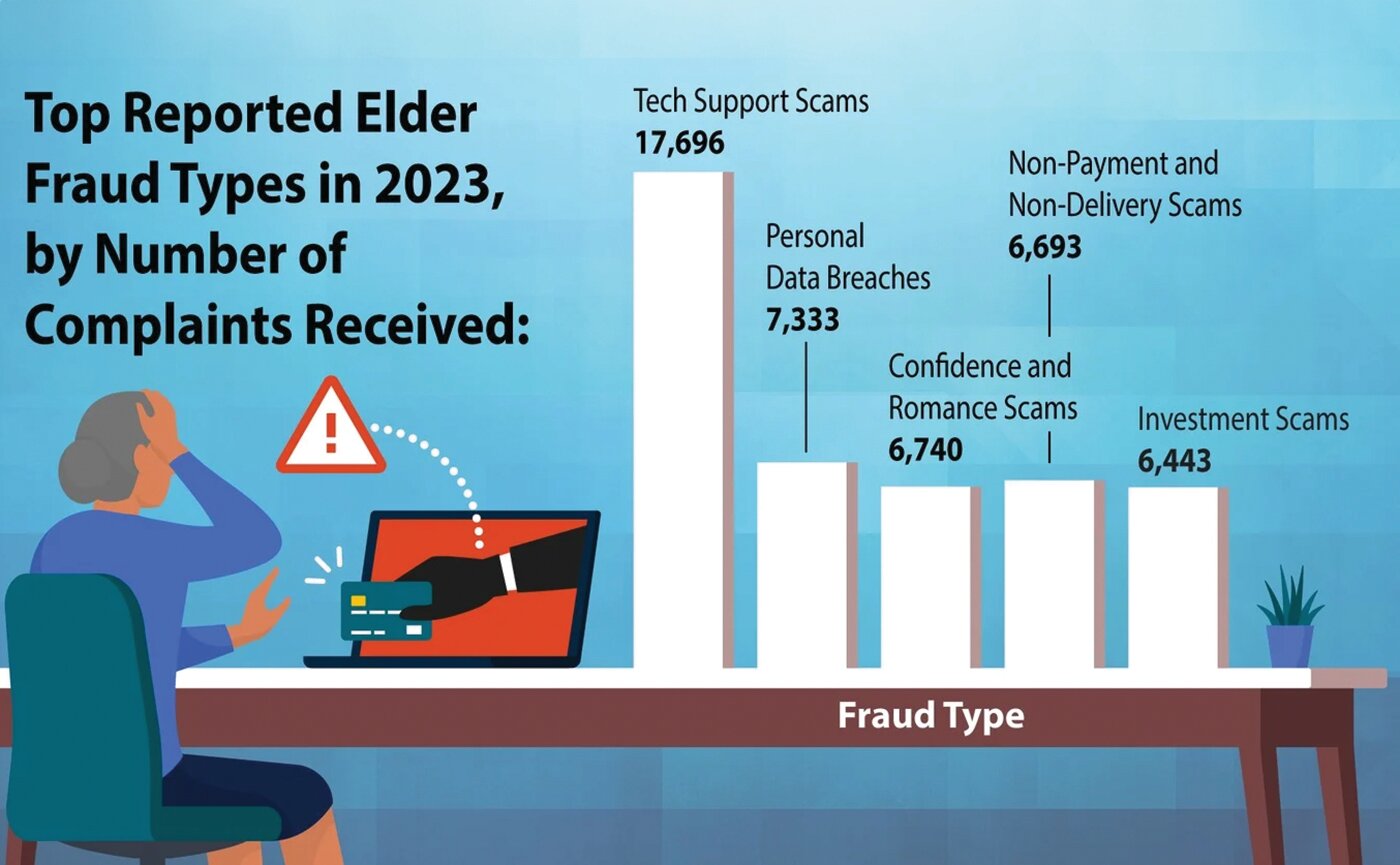Support the Timberjay by making a donation.
Elders at higher risk as targets of fraud and scams
REGIONAL- In a brand new report, the FBI’s Internet Crime Complaint Center (IC3) says there was a significant uptick in elder fraud complaints in 2023. The Elder Fraud Report, released on …
This item is available in full to subscribers.
Attention subscribers
To continue reading, you will need to either log in to your subscriber account, below, or purchase a new subscription.
Please log in to continue |
Elders at higher risk as targets of fraud and scams
REGIONAL- In a brand new report, the FBI’s Internet Crime Complaint Center (IC3) says there was a significant uptick in elder fraud complaints in 2023.
The Elder Fraud Report, released on Tuesday, indicates that elder fraud increased by 14 percent over the past year, with associated financial losses growing by about 11 percent to over $3 billion.
FBI Assistant Director Michael D. Nordwall said, “Combatting the financial exploitation of those over 60 years of age continues to be a priority of the FBI. Along with our partners, we continually work to aid victims and to identify and investigate the individuals and criminal organizations that perpetrate these schemes and target the elderly.”
The annual report specifically highlights fraudulent activities against older Americans, as perpetrators target their financial resources including money and cryptocurrency.
The 2023 report outlines several critical points:
• Financial impact – Elder fraud resulted in over $3.4 billion in losses in 2023, with the average victim losing $33,915.
• Demographic disproportion – Over 101,000 victims aged 60 and over reported to IC3, versus just 18,000 victims under age 20.
• Common scams – Tech support, personal data breaches, confidence and romance scams, non-payment, and investment scams were the top fraud types reported by seniors.
• Costliest scams – Investment scams topped the list in terms of financial impact, costing victims over $1.2 billion in 2023.
• Cryptocurrency targeting – Over 12,000 seniors reported scams involving cryptocurrency.
The document notes that the incidence of elder fraud may be far higher, as many seniors may not report fraud due to lack of knowledge on how to report, shame, or fear of losing financial autonomy in the eyes of their families. When they do report, detailed information may be scarce.
Common elder fraud schemes
Elder fraud can take on many guises, reinforcing the need for elders to be vigilant but increasing the challenges of doing so. Some common financial scams are:
• Romance scams – Criminals pose as romantic interests on digital platforms.
• Tech support scams – Scammers claim to solve non-existent technology issues to gain remote access to computers or smartphones.
• Grandparent scams – Imposters pose as an elder’s relative in financial distress.
• Government impersonation – Criminals impersonate officials and even law enforcement and threaten legal action to extort money.
• Sweepstakes/charity scams – Scammers pretend to be from charities or claim the victim has won a prize requiring a fee.
• Home repair scam – Fraudsters charge upfront for never-provided services.
• TV/radio/social media scams– Scammers use illegitimate ads to lure victims with services like reverse mortgages.
• Family/caregiver scams – Relatives or caregivers financially exploit the elderly.
And, according to various sources, scammers are becoming more efficient and effective through the use of artificial intelligence (AI). If scammers can obtain a voice recording of a relative, they can create an interactive AI audio “bot” that sounds just like the real person. That interactive bot can increase the perceived realism of a call for financial assistance. With pictures found online, a fake AI video of someone can be used to scam elders, who are less adept at recognizing the signs of deepfakes.
AI can be used to create automated chat bots that can mimic customer service representatives from well-known retailers to steal personal information, online, through robocalls, or through automated text and email scams.
What you can do
• Attempt to recognize and cease communication with scammers.
• Verify contact information and offers online. A reverse phone search can often reveal numbers commonly used by scammers.
• Resist the urgency to act hastily – scammers will pressure you to act quickly.
• Be wary of unsolicited communications and offers.
• Secure your personal and financial information.
• Update security software and enable pop-up blockers.
• Get assistance in setting any social media accounts to the highest privacy/security levels available.
• Consider using a prepaid debit card instead of your bank card or credit card for online purchases.
• Monitor for any suspicious activity on your accounts.
• Report suspected fraud attempts immediately.
If you or someone you know may have been a victim of elder fraud, contact your local FBI field office or submit a tip online at tips.fbi.gov. If the suspected fraud was internet-facilitated, you can also file a complaint with the FBI’s Internet Crime Complaint Center at ic3.gov.
By staying informed and cautious, seniors can better protect themselves from the financial and emotional damage caused by fraud.






